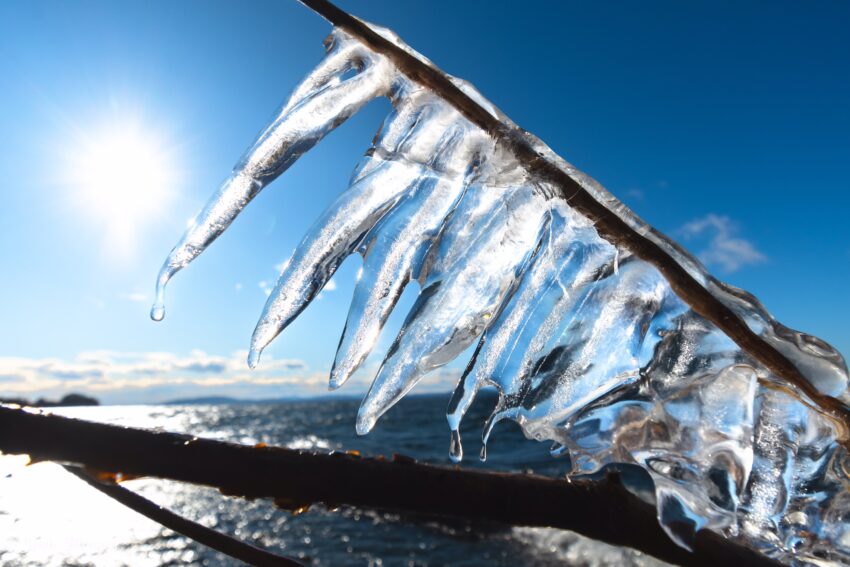Each day is lighter a bit earlier. Around the holidays I’d flip on the outside lights before four in the afternoon: now dark doesn’t fall until after six. We still pull out the folding card table each evening, set it up in the living room, light the fireplace and have dinner in front of it. We’ll continue this until having an extra fire throws off too much heat and light comes through the windows ruining the ambiance.
It is the season of change. Yesterday I went out to feed chickens without gloves and when finished, my hands burned. I could feel the pulse of my heartbeat in my fingertips. Today I left for a rehearsal in a wool sweater and no gloves. Without wind as a sidekick, the sunshine carries new warmth. By noon rivulets of icy water begin carving the driveway, and the surface of our road is slick and soft under foot. You can smell maple sap in the air and blue lines, like veins, begin to appear strung throughout the woodlands. On warm February days spring periodically peeks out from under the cover of muddy roads and from behind dirty white piles of snow, retreating back into hiding each night, like my chickens racing into their coops as light fades and the cold returns.
The top of the cherry bar in our kitchen is strewn with clay pots filled with purple hyacinths and spindly yellow daffodils. Someone gave me the gift of a small terrarium filled with the moss and soil of Tunbridge, one of my very favorite places. It sits on my window sill, a Tunbridge microcosm in a small glass jar under the cover of plastic wrap. Thin mossy fingers reach for the light and, although I never water it, little red berries appear as if from nowhere. Our kitchen has the earthen smell of a green house and split pea soup I’ve made. The old yellow metal golf ball basket on the counter is full of eggs; chocolate brown, hazy purple, blue. Our hens sense the change in light and return from siesta.
In the schools, winter sports have their final hurrah. As hockey ends, baseballs thrown in a gymnasium until the fields dry out, begin. One evening, checking emails, I find a video sent to me by the mother of one of my students. I watch Ethan from a side view. He is at his senior-night hockey game. Dressed in his white and blue uniform he looks inflated by the many pads he has on. He sits on a metal folding chair and I can see the black skates on his feet, blades pushed into the rubber of the box. In his hands are a cello and a bow. He begins playing the national anthem, the pads on his arms bulging as he bows the strings. In the background parents strain to get a good angle with their phones. It isn’t often you see someone playing a cello at an ice rink. He finishes with a powerful down-bow and pushes his hair back with his bow hand. I can’t see his face as he stops. The crowd erupts with clapping and cheering and I watch as the men with phones nod their heads, shocked and approving simultaneously. The video stops.
I started with Ethan when he was in fourth grade. He wore a bow tie to his first lesson: at first glance I thought he might be forty.
The video moves me in a way that has nothing to do with how he played the anthem. I find myself focused on the small details, like the way his skates tucked under him as he bowed, how the metal chair was slightly rusted at the joints. I watched the heavy-set man videoing him and wondered why his coat wasn’t zipped in a hockey rink. My thoughts seemed slowed, as if cold. Ethan wasn’t Ethan: he was a young man making a statement, unaware he was making it.
Sports in rural towns of Vermont are a big deal. Music not so much. Ethan decided to play hockey as a senior in high school because he hadn’t done it and had always wanted to. He had some pond hockey experience with his dad but no organized sports time.
He is a talented cellist, is a member of the Vermont Youth Orchestra, will play in the New England Music Festival orchestra and sits third in All-State. He has worked hard and he hasn’t worked hard. He is a kid. That night he wanted to be a hockey player but his captain asked him to play the anthem and so the cello followed him to the rink, reminding him of who he also is.
He could have said “no” when asked. When I see the video, my first reaction is disbelief that he even agreed to do it. In pads. In skates. With a cello that belonged to the school, not even his own.
The men straining to video him were surprised because this kid had a cello at a hockey rink and could really play. Watching, I knew that Ethan knew that his playing would steal his hockey thunder. He knew it, he didn’t want it, and yet he did it. I’m not sure he can yet understand the core bravery of that. He was telling us who he is, but more important, he was telling himself who he is. As the video ends, I sit quietly, just looking at his image. Frozen.
I pull on my boots and step out into under the night sky. The snow moon shines in full pregnancy above, casting a blue light on everything around me. As I look up I blow white breath up to the sky, a winter dragon. Tomorrow the sun will shine and the grip the ice has on the land will soften. We won’t see it, but change is happening.
